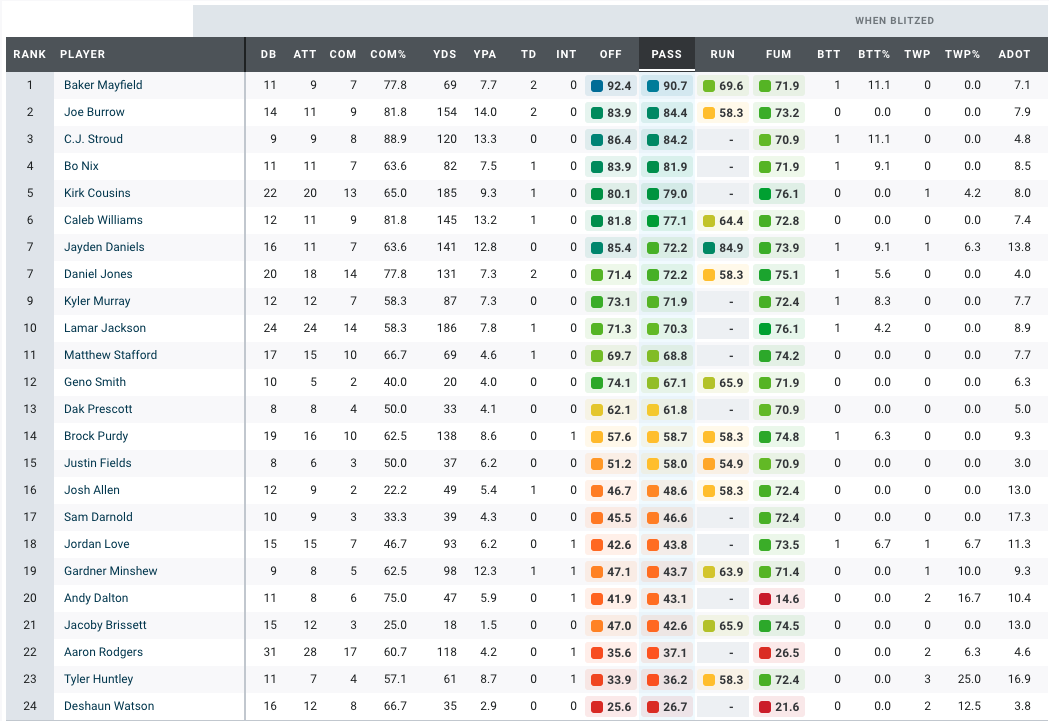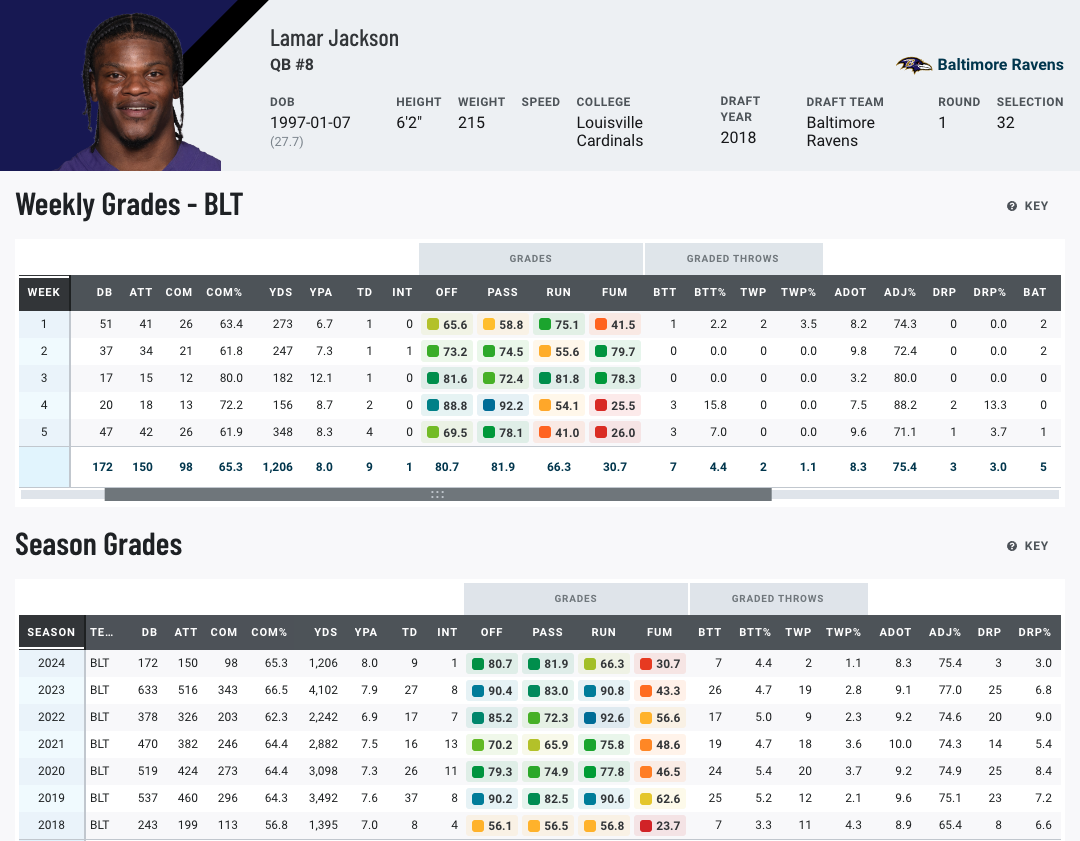• Trouble in Buffalo: The Bills defense hasn't stood tall against two AFC teams, and QB Josh Allen isn't being protected.
• The 49ers haven't closed games: San Francisco should be 4-1, but late turnovers and special teams errors have resulted in two losses.
• Unlock your edge with a PFF+ subscription: Get full access to all our in-season fantasy tools, including weekly rankings, WR/CB matchup charts, weekly projections, the Start-Sit Optimizer and more. Sign up now!
Estimated reading time: 7 minutes
After Week 2 of the NFL season, everyone ogled at the flashy Saints offense, the dominant all-around Bills and the defense-oriented Seahawks. As it turns out, those three trends have been bucked only three weeks later.
It’s not as if it’s time to press the panic button for teams that started white-hot and haven’t succeeded in the last few weeks, but some problematic patterns have begun to emerge.
Here are the issues that have plagued what looked like unstoppable forces, including some easy corrections and more troubling deep-seated developments.
Buffalo Bills: Defense and pass protection
It looked like it would take a Herculean effort to stop the Bills, who outscored opponents 112-48 over their first three games. However, marquee road clashes at Baltimore and Houston have left a very different and bitter taste in mouths.
The biggest concern in the past two weeks has been Sean McDermott’s defense, which has been gashed in multiple facets. Against the Ravens, it was in the run game, where Baltimore averaged 8.0 net yards per rush. Then in Houston, C.J. Stroud cooked Buffalo to the tune of 8.7 passing yards per attempt.
The Bills defense needed players to step up in light of departures this offseason, and those performances have been a mixed bag — particularly in the secondary. Much of the same applies to a linebacking corps ravaged by injuries. Neither area appears solidified.
Offensively, the Bills missed Khalil Shakir greatly against Houston. The bigger problem, though, was that Josh Allen was again under duress a considerable amount. A staggering 42.3% of Allen’s dropbacks have come under pressure the past two games, forcing him off his spot. In fact, Allen’s 37.7 passing grade in Week 5 was his lowest since 2019.
Buffalo’s three wins have come over an Arizona team with one of the worst defenses in football, not to mention the disappointing Dolphins and Jaguars. The offense will need to better protect Allen (and get improved play from other receiving options), and the defense must play more cohesively — or else the 3-0 start may have been a mirage.

Seattle Seahawks: Defensive stops
After three games, the Seahawks defense appeared as if it had turned a corner under Mike Macdonald’s tutelage, ranking first in EPA allowed per play. But against the Lions and Giants, things took a wayward turn — all the way down to 30th in EPA allowed per play.
Seattle’s most glaring issue has been getting off the field. The Seahawks permitted 20 first downs in Detroit in Week 4, then 24 the following matchup against the Giants. Both teams also converted third-down attempts at a 50% clip.
Moreover, the Seahawks’ once-stingy secondary hasn’t matched that production in the last two weeks. Only one defender (Tyrel Dodson, Week 5) to play 10-plus coverage snaps has recorded a coverage grade above 68.0 in the past two games.
Will Macdonald’s defense yield less separation moving forward, or will the unit keep its offense off the field? That question may determine Seattle’s trajectory for the rest of the year.
Pittsburgh Steelers: Zone coverage and run defense
The Steelers crawled to a 3-0 start, fueled by an overpowering defense. However, with the offense stuck in neutral the entire way, that defense has started to falter — especially in big moments.
Pittsburgh’s secondary has been extremely liable to big plays in the past two weeks. Consider this: in Weeks 1-3, the Steelers allowed 11 explosive passes (15-plus yards), but that number jumped all the way up to 13 in just the past two games. The team’s communication in zone in the back end hasn’t been adequate, resulting in frequently busted coverages and open receivers down the field.
The Steelers’ once-stringent run defense has leaked, too. In the last two weeks, Pittsburgh is 21st in rushing yards before contact allowed per attempt, giving up 15 rushing first downs (T-19th). The team’s defensive linemen haven’t effectively shed blocks, and its linebackers have struggled to be aggressive.
Pittsburgh’s defense still ranks 12th in EPA allowed per play, so it isn’t totally time to overreact yet. But if the unit can’t generate pressure — especially due to edge rusher injuries — then its efficacy is limited greatly.

New York Jets: Offensive efficiency
As the Jets' talented defense has rounded into form, their offense has done a 180. Over the last two weeks—against the Broncos and Vikings—Aaron Rodgers and company sit only 31st in EPA per play.
One concern has been turnovers — especially in London in Week 5, where Rodgers tossed three picks. That game against Brian Flores’ defense saw Rodgers record his worst passing grade (48.3) in a full game since 2021.
It hasn’t only been on the shoulders of No. 8, though. Breece Hall has struggled over the last two weeks, tallying only 27 carries on 19 attempts. Hall hasn’t forced a missed tackle in that span, and only one of those totes went for 10 or more yards.
The Jets still boast Rodgers, Hall and Garrett Wilson, so it still feels too early to panic about the offense. Still, Nathaniel Hackett’s bunch needs to get into a rhythm sooner rather than later.
New Orleans Saints: Offensive efficiency
Klint Kubiak appeared the next head-turning offensive coordinator after two weeks, catapulting the Saints to 91 points and the best EPA per play average in the NFL by a wide margin. Since that Week 2 win in Dallas, though, offensive production has been much tougher to realize.
In Weeks 3-5, the Saints ranked 24th in EPA per play. The team’s run game, which flourished to start the season, hit a lull, generating only five explosive rushes and 3.5 yards per attempt against the Eagles, Falcons and Chiefs.
In terms of the air, Derek Carr bounced back in Week 4 after an underwhelming game against the Eagles. Even then, Kubiak had to significantly alter his approach, turning to far less play action. Only 20% of Carr’s Weeks 3-5 dropbacks came on play action, compared to 51.2% in Weeks 1-2.
If New Orleans can generate better success in its rushing attack, it should open the door for a return to play action shots, which is where its offense was unbelievably dynamic to begin the season.
San Francisco 49ers: Fourth-quarter mistakes
The 49ers sit at 2-3, but they very easily could be 4-1. In fact, San Francisco has held a lead of 10-plus points in the fourth quarter of two of its three losses.
So, how did the Rams (Week 3) and Cardinals (Week 5) pull off improbable comebacks? It largely stems from San Francisco’s defense not holding down the fort in the fourth quarter.
The 49ers’ defense ranks 27th in EPA per play in the final quarter. While San Francisco’s late-game passing defense hasn’t been awful, its run defense has suffered lapses, including allowing 11 rushing first downs in the fourth quarter (10th-most) and sitting 27th in rushing yards allowed before contact.
Kyle Shanahan’s offense has faded down the stretch, too. The 49ers sit sixth in EPA per play but dwindle down to 11th with 4 minutes to go in the fourth quarter. Untimely turnovers — including a Jordan Mason fumble at the 8-yard line and Brock Purdy interception with the 49ers driving — doomed a divisional win against Arizona in Week 5.
Even special teams have been to blame. Against the Rams, Jake Moody missed a 55-yard field goal with 2:48 left that would have put San Francisco up 10. Subsequently, the Rams’ Xavier Smith netted a 38-yard punt return that put L.A. at the 50-yard line with under 1 minute left, which set up the game-winning field goal.
It’s more likely than not that the formidable 49ers will sort out their late-game blunders and return to the form we’ve grown accustomed to seeing, but this pattern of costly errors is at least eyebrow-raising.




 © 2024 PFF - all rights reserved.
© 2024 PFF - all rights reserved.